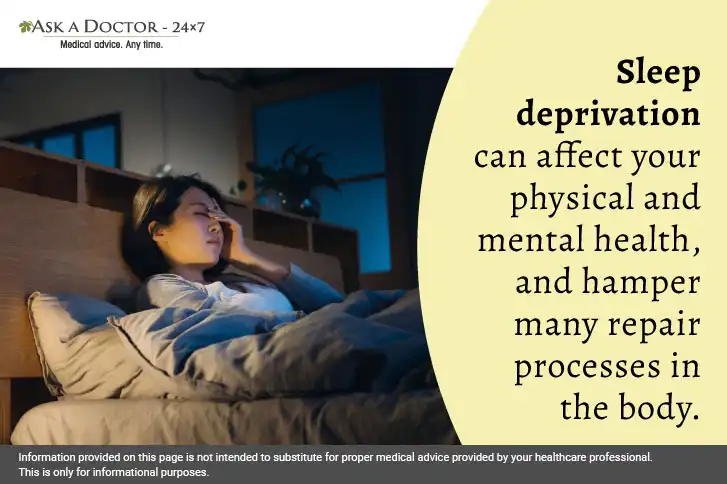Sticking To A Regular Sleep Schedule Matters! Here's Why?
“The best bridge between despair and hope is a good night's sleep.” – E. Joseph Cossman.
Sleep is vital for our health just like a healthy diet and exercise. Good sleep revitalizes our body and mind and aids cognitive and behavioral functions. Adequate sleep also supports numerous repair processes of the body.
Depending upon the lifestyle and activity level, sleep needs slightly vary from individual to individual. According to the American Academy of Sleep Medicine (AASM) and Sleep Research Society (SRS), the average adult should sleep 7 or more hours every night for optimal health. The National Sleep Foundation (NSF) recommends 7 to 9 hours of sleep for adults and 7 to 8 hours of sleep for older adults.
A good night’s sleep doesn’t just imply sleeping for sufficient hours. Sleep quality and a consistent sleep schedule are the other two crucial aspects of healthy sleep.
Understand the Physiology of Sleep
When you sleep, your body follows a sleep cycle consisting of four stages. Each sleep cycle repeats itself about 4 to 6 times throughout the night and lasts for approximately 90 to 100 minutes.
4 Stages of Sleep Cycle
The four stages of a sleep cycle include:
Stage 1 non-rapid eye movement (NREM) sleep: It involves light sleep as you make the switch from wakefulness to sleep. There is muscle relaxation, and slowing of the heart rate breathing, brain activity, and eye movements. This stage lasts for just a few minutes.
Stage 2 NREM sleep: It is the longest stage and involves further slowing of the heart rate and breathing. Muscles get more relaxed, eye movements stop, and body temperature drops. It lasts for about 10 to 25 minutes during the first sleep cycle and then it gets longer.
Stage 3 NREM sleep: This is the deep sleep or delta sleep stage. It is because of this stage that you feel recharged and rejuvenated after waking up. Breathing, heart rate, and brain activity are at their lowest levels during this stage. Experts believe that this stage is very important for growth (in children) and recovery. It lasts for about 20 to 40 minutes during the early sleep cycles. In the later cycles, it gets shorter.
Stage 4 REM sleep: The first REM stage occurs about 90 minutes after sleeping. The duration of REM sleep ranges from 10 minutes to 60 minutes, with early stages lasting for a shorter duration than the later stages. It makes up about 25% of sleep in adults. During the REM stage, your eyes move back and forth very rapidly under your eyelids. You see clear dreams during this stage. REM sleep is essential to mental functions like learning, memory, and creativity.
Know the Consequences of Inadequate Sleep

Lack of sleep hampers brain function and impairs the ability to think and focus clearly. Sleep deprivation also impacts mood, heart health, respiratory and immune systems, and metabolism. Inadequate sleep also plays a role in increasing the risk of injuries and accidents caused by drowsiness and tiredness, including workplace mishaps and motor vehicle crashes. Sleep deprivation is, in fact, one of the leading causes of preventable motor accidents.
People who do not get adequate sleep or have interrupted sleep at night are at a higher risk of:
- High blood pressure (hypertension)
- Obesity
- Coronary heart disease
- Stroke
- Type 2 diabetes
- Poor mental health
- Mood swings
- Depression
According to experts, sleep is crucial for several repair processes in the body, e.g. of the blood vessels and the immune system. It is during sleep that repair processes mostly or most effectively take place. The brain, during sleep, works like kidneys and filters away toxins, including some proteins associated with Alzheimer’s disease. If you do not get good quality sleep, these repair processes are likely to be affected.
While chronic sleep deprivation may increase the risk of certain diseases, it may also be an indication of a sleep disorder such as insomnia and sleep apnea. If you often face trouble sleeping at night, you may Consult a Doctor Online and get the right treatment for your sleep problem.
Identify the Factors that Affect Sleep

Sleep problems may occur due to social, physiological, psychological, or environmental factors. These factors may disrupt your sleep quality, sleep schedule, and/or total sleep hours. You may work on these factors to have better mental health, memory, cognition, heart health, immunity, reproductive health, and hormone regulation.
Below are some of the common sleep disruptors that you must know:
- Stress
- Alcohol
- Caffeinated drinks in the late evening
- Late night parties
- Erratic morning and night schedule
- Exercising close to bedtime
- Use of electronic devices such as smartphones, tablets, or laptops before sleeping
- Mentally stimulating work just before sleeping
- Travelling
- Uncomfortable bed or mattress
- Very cold, hot, or humid room
- External noises while sleeping
Handy Tips to Get a Good Night's Sleep
You can improve your sleep hygiene and get good quality sleep by making some changes in your lifestyle. These include:
- Set and follow a sleep schedule. Waking up and going to bed at a fixed time every day, even on weekends, will set your body clock and you will be able to sleep soundly.
- Do not take caffeinated drinks in the evening as caffeine is a stimulant.
- Avoid heavy meals and alcohol before bedtime because these prevent deep sleep.
- Do not take naps in the late afternoon or evening.
- Restrict screen exposure at least half an hour before bedtime. Devices such as smartphones, tablets, and laptops emit short-wavelength enriched light or blue light that delays or reduces melatonin production. Melatonin is a natural hormone released in the evening to help you feel tired and drowsy.
- Create a suitable and comfortable sleeping environment in your bedroom. Before sleeping make the room dim and get rid of unwanted sounds and noise. Keep your phone on silent or airplane mode.
Waking up with an energized mind and soul to begin each day with a zeal to achieve something substantial will be possible only if you get quality sleep at night.
If you desire to experience a quiet and feathery sleep, make sure to incorporate the above-discussed small changes in your lifestyle and you will certainly reap the benefits. However, if you are suffering from insomnia or any other sleep disorder then consult a physician or a psychologist without further delay. Never engage in self-medication to treat insomnia, as it could be highly dangerous to health.
For more queries or personalized guidance Talk to a Specialist now.
Recently Answered Questions Related to Sleep and Related Disorders
Information provided on this page is not intended to substitute for proper medical advice provided by your healthcare professional. This is only for informational purposes.
Ask a Specialist
Recent Questions


